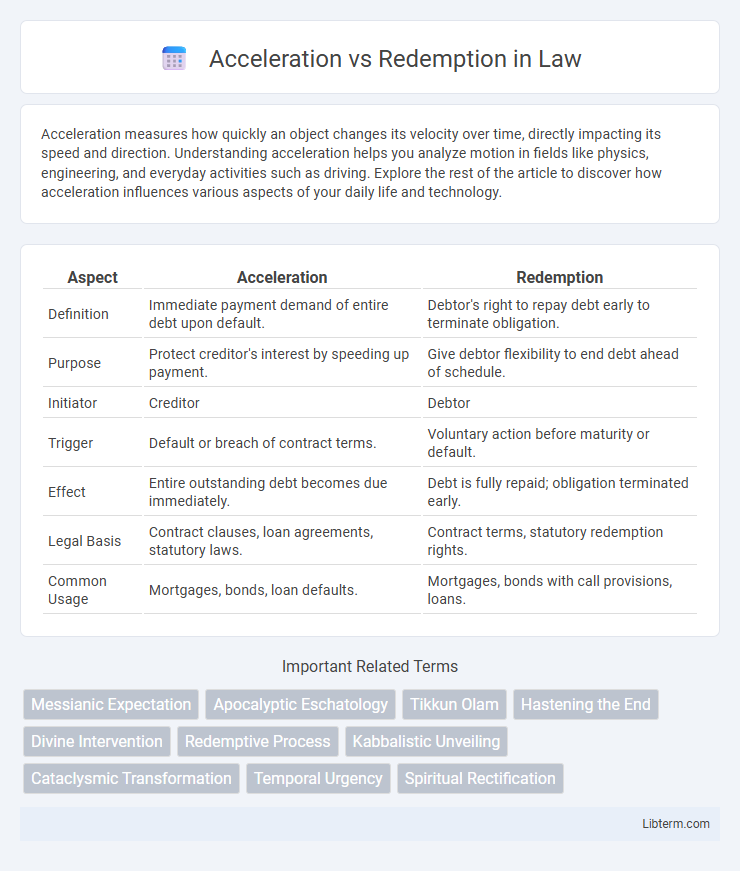Acceleration measures how quickly an object changes its velocity over time, directly impacting its speed and direction. Understanding acceleration helps you analyze motion in fields like physics, engineering, and everyday activities such as driving. Explore the rest of the article to discover how acceleration influences various aspects of your daily life and technology.
Table of Comparison
| Aspect | Acceleration | Redemption |
|---|---|---|
| Definition | Immediate payment demand of entire debt upon default. | Debtor's right to repay debt early to terminate obligation. |
| Purpose | Protect creditor's interest by speeding up payment. | Give debtor flexibility to end debt ahead of schedule. |
| Initiator | Creditor | Debtor |
| Trigger | Default or breach of contract terms. | Voluntary action before maturity or default. |
| Effect | Entire outstanding debt becomes due immediately. | Debt is fully repaid; obligation terminated early. |
| Legal Basis | Contract clauses, loan agreements, statutory laws. | Contract terms, statutory redemption rights. |
| Common Usage | Mortgages, bonds, loan defaults. | Mortgages, bonds with call provisions, loans. |
Understanding Acceleration: Core Concepts
Acceleration in finance refers to the clause allowing a lender to demand full repayment of a loan before its scheduled maturity upon specific default events. Key concepts include the acceleration clause triggering immediate repayment obligations and the impact on remaining redemption schedules for bondholders or borrowers. Understanding these core principles is essential for managing credit risk and loan enforcement strategies effectively.
Defining Redemption in Modern Contexts
Redemption in modern contexts refers to the process of regaining value, status, or freedom through acts of restitution, atonement, or repayment, particularly in financial and personal development settings. It encompasses debt repayment, recovery from financial distress, and transformative personal growth achieved by addressing past mistakes or obligations. This concept is integral to legal, financial, and psychological frameworks where restoring trust, credit, or self-worth is pivotal.
Historical Perspectives on Acceleration and Redemption
Acceleration and redemption have evolved significantly through history, particularly in mortgage and loan practices where acceleration clauses allowed lenders to demand immediate repayment upon default. Traditionally, redemption rights provided borrowers with a crucial opportunity to reclaim their property by paying off the owed debt before foreclosure completion. Over time, legal systems refined these concepts to balance creditors' rights with consumer protections, reflecting shifting economic and societal priorities.
Acceleration: Drivers and Consequences
Acceleration clauses in loan agreements are triggered by specific events such as borrower default, cross-default provisions, or failure to meet financial covenants, forcing immediate repayment of the entire loan balance. These drivers increase lender control and risk mitigation by enabling swift action to recover funds, often leading to increased financial pressure and potential insolvency for borrowers. Consequences of acceleration include drastic liquidity shortages, accelerated interest costs, and potential foreclosure or bankruptcy proceedings, impacting both borrower creditworthiness and lender recovery outcomes.
Redemption: Pathways and Outcomes
Redemption offers diverse pathways including debt forgiveness, refinancing, and structured repayment plans tailored to individual financial circumstances. These pathways enable borrowers to recover creditworthiness and avoid foreclosure or legal action, promoting long-term financial stability. Effective redemption outcomes often result in improved credit scores and restored access to future credit opportunities.
Philosophical Debate: Progress vs Restoration
Acceleration advocates emphasize rapid progress and technological advancement as catalysts for societal evolution, prioritizing innovation and future-oriented growth. Redemption advocates argue for restoration and healing of past injustices, focusing on ethical reconciliation and sustainable values rooted in historical awareness. The philosophical debate hinges on whether true development arises from relentless forward momentum or reflective restoration of foundational principles.
Societal Impacts: Acceleration versus Redemption
Acceleration in technology and social change accelerates urbanization, economic disparities, and environmental degradation, intensifying societal challenges like inequality and resource scarcity. Redemption emphasizes restorative justice, sustainable development, and community rebuilding, promoting social equity, environmental recovery, and cultural preservation. Societal impacts hinge on balancing rapid technological progress with ethical considerations and long-term resilience to foster inclusive and sustainable communities.
Ethical Considerations in Accelerated Change
Acceleration of change in organizations raises ethical considerations, including transparency, consent, and potential impacts on employee well-being. Rapid transformations may lead to unintended consequences such as job displacement or increased stress, requiring ethical frameworks to ensure fairness and accountability. Balancing the urgency of acceleration with responsible decision-making is crucial to uphold organizational integrity and stakeholder trust.
Redemption Narratives in Popular Culture
Redemption narratives in popular culture often center on characters overcoming past mistakes, personal flaws, or social stigmas to achieve moral or spiritual renewal, resonating deeply with audiences seeking hope and transformation. These stories are prevalent across genres, from classic literature and cinema to contemporary television shows and video games, highlighting themes of forgiveness, self-discovery, and the human capacity for change. Examples such as Jean Valjean in Victor Hugo's "Les Miserables" and Walter White in "Breaking Bad" exemplify how redemption arcs drive emotional engagement and character complexity, making them a cornerstone of storytelling that contrasts with narratives focused solely on rapid progress or "acceleration.
The Future: Balancing Acceleration and Redemption
The future of finance hinges on balancing acceleration and redemption to optimize liquidity management and investor confidence. Acceleration mechanisms enable quicker access to funds during financial distress, while redemption rights provide structured exit strategies protecting investor interests. Effective integration of both strategies fosters a resilient market environment supporting sustainable growth and risk mitigation.
Acceleration Infographic

 libterm.com
libterm.com